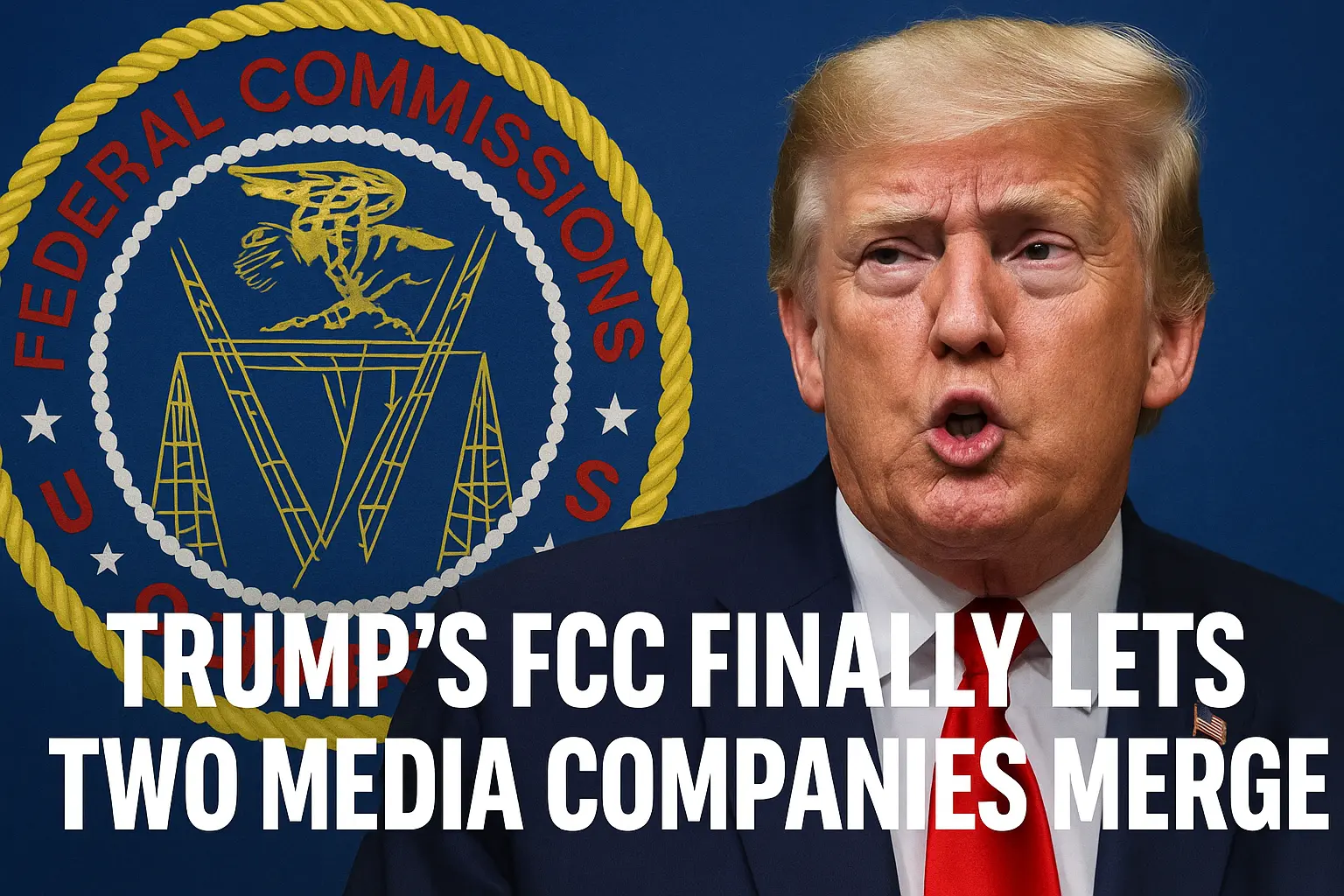The FCC under Trump approves Paramount-Skydance merger amid controversy, political concessions, and media bias allegations. Here’s what it means for press freedom.
Table of Contents
Introduction: A Political Merger Wrapped in Media Chaos
In a landmark and deeply controversial move, the Trump administration’s Federal Communications Commission (FCC) has officially approved the long-pending merger between Paramount Global and Skydance Media, greenlighting an $8 billion deal that could fundamentally reshape the American media landscape.
But this isn’t just another corporate merger—it’s a story layered with political tension, diversity backlash, and allegations of favoritism from the very top. From “DEI rollbacks” to Trump’s own public boasts of receiving millions in “commitments,” this deal has raised serious concerns over press freedom, regulatory neutrality, and ideological influence over newsrooms like CBS News.
Let’s break down what’s happening, what’s at stake, and why this may be one of the most polarizing media mergers in modern history.
Timeline: How the Paramount-Skydance Deal Unfolded
- April 2024: Skydance Media begins talks to acquire Paramount Global.
- May 2024: Reports surface that Trump-appointed FCC chair Brendan Carr is reviewing the deal.
- July 1, 2025: Paramount agrees to pay $16 million toward Trump’s presidential library, allegedly to settle legal disputes.
- July 23, 2025: Trump boasts on Truth Social of receiving “over $36 million” in commitments from Paramount-Skydance.
- July 24, 2025: FCC approves the deal in a 2-1 party-line vote.
- July 25, 2025: Democratic lawmakers accuse the FCC of corruption and demand an investigation.
Who’s Who: The Key Players in This Controversial Merger
- David Ellison – CEO of Skydance Media and new head of Paramount.
- Brendan Carr – Trump’s FCC Chair and the architect of the deal’s approval.
- Donald Trump – Allegedly involved in “side agreements” and vocal about CBS coverage.
- Anna Gomez – The lone dissenting FCC Commissioner, raised concerns about press freedom.
- CBS News – Paramount’s flagship news division, long criticized by Trump.
CBS DEI Controversy: Why Diversity Was the Price of Approval
In what many view as a capitulation to political pressure, Skydance’s commitments to gain FCC approval included:
- Hiring an ombudsman at CBS to investigate “bias.”
- Pledging not to implement new DEI (Diversity, Equity, and Inclusion) policies.
- Ensuring programming includes “a diversity of viewpoints,” a term critics argue is code for enforcing right-wing narratives.
These pledges were essential to securing FCC Chair Carr’s approval, who stated:
“Skydance will adopt measures that can root out the bias that has undermined trust in the national news media.”
Democrats claim this erodes the independence of the press and sets a dangerous precedent where government approval is tied to ideological loyalty.
The Fallout: Reactions from Politicians, Journalists, and the Public
🔥 Political Backlash
- Senators Ed Markey and Ben Ray Luján called the approval “the worst form of corruption.”
- Senator Elizabeth Warren demanded a federal investigation, calling it potentially criminal.
- Democrats allege Trump extorted media companies for favorable coverage and money.
📣 Journalists’ Response
- CBS News staffers fear increased censorship and editorial oversight.
- “60 Minutes” executive producer Tanya Simon was promoted—a move seen by some as a stabilizing gesture.
- Satirical media like “South Park” and Jon Stewart’s “Daily Show” openly mocked the merger and Trump’s involvement.
Expert Commentary: Is This the End of Independent Journalism?
Media Analysts Weigh In
Brian Stelter, media commentator:
“What’s unfolding here is not just a merger—it’s a government-blessed ideological takeover of a major news organization.”
Nora Benavidez, PEN America:
“This merger weaponizes regulation as a tool to punish unfavorable journalism.”
Harvard’s Nicco Mele, tech/media expert:
“This may become a blueprint for future political influence over press institutions.”
How This Changes the U.S. Media Landscape
🎯 Consolidation of Power
Skydance’s acquisition of Paramount further reduces the number of independent media conglomerates. Combined with Disney, Warner Bros. Discovery, and Comcast, the “Big Four” now becomes the Big Three.
📺 Conservative Shift in News Programming
Expect CBS and possibly Comedy Central to lean more neutral—or even conservative—in editorial tone. Internal pressure to avoid topics like racial equity, LGBTQ+ issues, and political criticism of Trump is expected to grow.
🚨 Chilling Effect on Newsrooms
Other networks may preemptively soften coverage of political figures to avoid similar scrutiny or government interference. This could mark a dramatic turning point in American journalism.
FAQs About the Paramount-Skydance Merger
❓Why did the FCC approve the Paramount-Skydance merger?
The Trump-aligned FCC approved the merger after Skydance committed to reducing DEI initiatives and addressing concerns about media bias at CBS News.
❓Was Donald Trump directly involved in the merger?
While he did not formally participate in regulatory procedures, Trump publicly boasted about receiving financial commitments tied to Paramount, raising questions about backdoor influence.
❓What does this mean for CBS News?
CBS News will now be overseen by an ombudsman and is expected to shift editorial strategy to appease both political and corporate pressures.
❓Are there legal challenges expected?
Yes. Democrats are calling for investigations into possible bribery or abuse of power tied to the deal. A congressional hearing or federal probe could be underway.
❓Will this impact streaming services like Paramount+?
Likely. While Skydance may inject new content and capital, political controversy could affect consumer trust and content strategies.
Conclusion: A Dangerous Precedent or a Bold Reset?
Whether viewed as a necessary shake-up or an egregious abuse of government power, the Trump FCC’s approval of the Paramount-Skydance merger is a flashpoint in the ongoing battle over press freedom, corporate consolidation, and political influence in media.
The full consequences may take months—or even years—to fully understand. But one thing is certain: The media landscape in America just changed forever.
